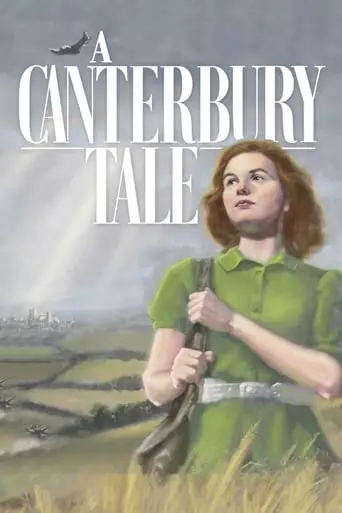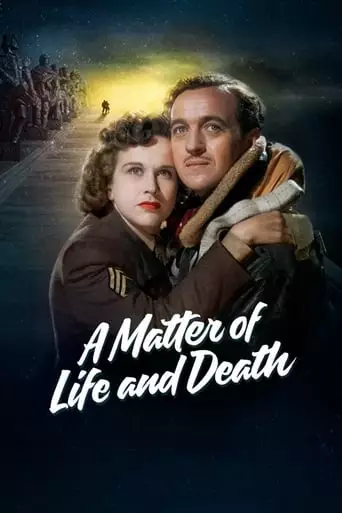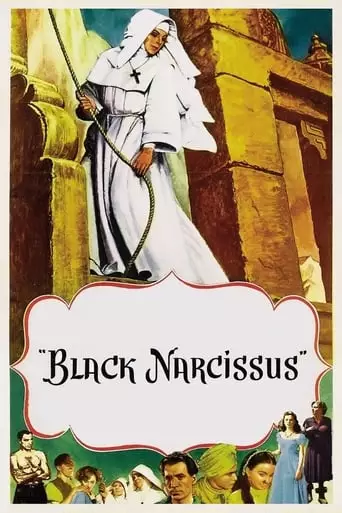Plucky Englishwoman Joan Webster travels to the remote islands of the Scottish Hebrides in order to marry a wealthy industrialist. Trapped by inclement weather on the Isle of Mull and […]

Plucky Englishwoman Joan Webster travels to the remote islands of the Scottish Hebrides in order to marry a wealthy industrialist. Trapped by inclement weather on the Isle of Mull and […]

At the height of World War II, the Germans begin dropping a new type of booby-trapped bomb on England. Sammy Rice, a highly-skilled but haunted bomb-disposal officer, must overcome his […]

Three modern day pilgrims investigate a bizarre crime in a small town on the way to Canterbury. The Canterbury Tale is a unique blend of mystery, drama, and wartime reflection […]

General Candy, who’s overseeing an English squad in 1943, is a veteran leader who doesn’t have the respect of the men he’s training and is considered out-of-touch with what’s needed […]

When a young RAF pilot miraculously survives bailing out of his aeroplane without a parachute, he falls in love with an American radio operator. But the officials in the other […]

A group of Anglican nuns, led by Sister Clodagh, are sent to a mountain in the Himalayas. The climate in the region is hostile and the nuns are housed in […]

In this classic drama, Vicky Page is an aspiring ballerina torn between her dedication to dance and her desire to love. While her imperious instructor, Boris Lermontov, urges to her […]
Emeric Pressburger: The Visionary Storyteller of British Cinema
Emeric Pressburger, often remembered as one-half of the iconic filmmaking duo “The Archers” alongside Michael Powell, was a Hungarian-British screenwriter, producer, and director whose work has become synonymous with the golden age of British cinema. Together, Powell and Pressburger crafted some of the most visually stunning and narratively rich films of the mid-20th century, blending bold storytelling with a distinctive artistic flair.
With classics like The Red Shoes (1948), A Matter of Life and Death (1946), and Black Narcissus (1947), Pressburger’s contributions to cinema have left an enduring legacy of creativity, innovation, and emotional depth.
Early Life and Career
Emeric Pressburger was born Imre József Pressburger on December 5, 1902, in Miskolc, Hungary. Raised in a Jewish family, Pressburger showed an early aptitude for storytelling and a love of literature. He studied engineering and mathematics at the University of Prague and later attended the Technische Hochschule in Stuttgart, but his passion for writing led him to pursue a career in journalism and screenwriting.
In the 1920s, Pressburger began working as a screenwriter in Berlin, contributing to the thriving German film industry during the Weimar Republic. However, with the rise of Nazism, he fled to Paris and eventually settled in London in 1935.
The Archers: A Unique Collaboration
In 1939, Pressburger met Michael Powell while working on The Spy in Black. The two quickly formed a creative partnership that would redefine British cinema. In 1942, they founded their production company, “The Archers,” adopting the motto: “We have great ambitions. Our aim is to make the perfect film.”
Their collaboration was marked by an unusual division of labor: Powell directed while Pressburger wrote the scripts, often co-producing and contributing to the overall creative vision. This synergy allowed them to create films that were as visually striking as they were narratively complex.
Hallmarks of Pressburger’s Storytelling
Emeric Pressburger’s writing was characterized by:
Imaginative Narratives: His stories often blended realism with fantasy, creating worlds that felt both magical and grounded.
Humanism: Pressburger’s characters were richly drawn, exploring universal themes of love, sacrifice, and redemption.
Moral Ambiguity: His scripts frequently delved into the complexities of human nature, avoiding simplistic portrayals of good and evil.
Cultural Depth: As a Hungarian émigré, Pressburger brought a European sensibility to his work, infusing his films with philosophical undertones and a cosmopolitan perspective.
Notable Films
The Life and Death of Colonel Blimp (1943)
This ambitious wartime epic follows the life of Clive Candy, a British officer, across decades of personal and professional struggles. The film explores themes of honor, friendship, and the passage of time, offering a nuanced portrayal of war and its impact on individuals.
A Matter of Life and Death (1946)
This romantic fantasy tells the story of a British airman (David Niven) who cheats death during World War II and must argue for his life in a celestial court. With its stunning Technicolor cinematography and philosophical depth, the film is considered one of the duo’s masterpieces.
Black Narcissus (1947)
Set in a remote Himalayan convent, this psychological drama explores the inner turmoil of a group of nuns grappling with desire, duty, and cultural dislocation. Pressburger’s screenplay masterfully balances tension and introspection, while Powell’s direction and Jack Cardiff’s cinematography create an unforgettable visual experience.
The Red Shoes (1948)
A visually sumptuous tale of ambition and obsession, The Red Shoes follows a young ballerina torn between her love for a composer and her devotion to dance. The film’s iconic ballet sequence and emotional resonance have made it one of the most celebrated films in cinematic history.
The Tales of Hoffmann (1951)
An adaptation of Jacques Offenbach’s opera, this film showcases Pressburger’s ability to weave music and storytelling into a seamless, visually extravagant experience.
Legacy
Emeric Pressburger’s contributions to cinema extended far beyond his collaborations with Powell. His storytelling sensibilities brought emotional depth, wit, and humanity to the screen, influencing filmmakers like Martin Scorsese, Francis Ford Coppola, and Wes Anderson.
Despite facing initial skepticism from critics and audiences, many of The Archers’ films have since been reappraised as masterpieces, celebrated for their boldness, artistry, and timeless appeal.
In 1981, Pressburger was awarded a Fellowship by the British Academy of Film and Television Arts (BAFTA), recognizing his significant contributions to British cinema.
Conclusion
Emeric Pressburger was a visionary storyteller whose work continues to captivate and inspire. His ability to blend fantasy with realism, coupled with his profound understanding of human emotion, resulted in films that transcend time and genre.
Through his partnership with Michael Powell, Pressburger created a cinematic legacy that remains unparalleled, a testament to the power of collaboration and the enduring magic of storytelling. His films remind us of the beauty, complexity, and wonder of the human experience, ensuring his place among the greatest filmmakers in history.